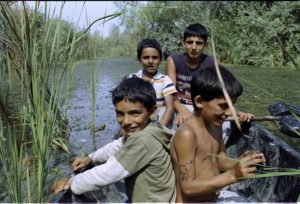This lush, riveting, award-winning film pits a family living off the grid against agents for social and environmental change, with consequences that threaten to tear the family apart. The setting is an urban wilderness on the edge of Bucharest, Romania, that evolved from a planned, Communist-era dam and failed real estate projects into Europe’s largest urban nature park.
Parents Gică and Nicolina, in back, with 7 of their 9 children. Later, an angry Gică asserts his authority: “I’m their father; I can kill them.”
As the film opens with a group of young boys wending their way through tall weeds and paddling on a pond, it’s hard to believe what we’re seeing isn’t fiction. These are some of the 9 children of Gică Enache and his wife, Niculina Nedelcu, who have made these abandoned 500 acres their home for 18 years. And it’s the unlikely journey of this Roma family—not Văcărești Nature Park, fascinating tale tho’ it is—that’s the subject of director and co-writer Radu Ciorniciuc’s provocative documentary.
Gică is the high-school-educated patriarch who once had an ordinary job (chemistry lab assistant) and then decided to live apart from “wicked civilization.” He and his wife fiercely protect their brood. “Hide the children,” they yell, when social workers approach their hut in the woods, threatening to take the children to orphanages or foster homes. Through Ciorniciuc’s lens, the lives of the siblings seem idyllic: grabbing swans with bare hands, swimming in the reservoir, catching fish at night, rolling around with each other at play, sleeping in the same bed. They’ve learned the life skills to survive in these fields, pools, and woods that nature has bequeathed them from abandoned industrial projects.
When the powers that be decide the land should be a nature park—and that the living situation of the children is “dangerous”—the battle lines are drawn between the Enaches and the government. Except the Enaches are not idealistic, ecologically sensitive Thoreaus. Perhaps sensing the fragility of his hold on the family, Gică seems to want to keep the children illiterate—into the stove goes a children’s book they’ve been given; they live in, and burn, garbage. And the government representatives are not all evil. Social agencies try to provide housing and education for the family after they’ve been forcefully re-settled in the city and a bulldozer arrives to remove the remains of their hut.
This “clash of civilizations” results in a sacrifice of this family’s way of life for what some will understand as a greater good: the nature park. The Enaches see themselves as stewards of the property. They’ve identified species living there that others have not. They know the land and would be able to communicate its secrets to tourists and visitors, and it’s clear that in a weak (and pathetic) moment, Gică imagines himself becoming a Park Ranger. But this is not enough to allow the Enaches to continue to live in a domain they’ve occupied for almost two decades. Even Britain’s Prince Charles, known for his support of environmental causes, gets in on the action, planting a tree so spindly that it stands in comic contrast to the willows Gică has planted, an offense to the way the Enaches have engaged and understood the terrain. In a poignant moment, Gică asks the Park Ranger if he can plant more willows. “The botanists will decide,” is the response.
There are clashes within the family as well, as the Enaches try to adapt to the urban center that is just a multi-lane highway and concrete levee away from their old homestead. Oldest son Vali, who has kept the family fed with his night fishing (and by selling some of his catch), defies his father with his desire to be in, and of, the city. The next oldest teen, Rică, struggles in school with his letters and with phonics; humiliated and resentful, he wants to return to the wilderness life. An angry Gică asserts his authority: “I’m their father; I can kill them.”
There are no easy answers here, just profound questions. To whom does the land belong? Are those who have been “stewards” of the land entitled to live on it? What does it mean to head a family? Is illiteracy a trade-off for living off the land? Is it worth sacrificing a family’s way of life for the “greater good” of a nature park that will serve thousands? Is a bike path for the middle class more important than one, very large, poor, working-class family?
“Acasă, My Home” is beautifully crafted. The people speak for themselves: no voice-overs, no talking heads, no explanatory captions, no details during the credits of what happened “after” the film. It’s gorgeous, emotionally charged, and challenging.
Date: 2020
Acasă, My Home (“Acasă”) – Stars: 3.5 (out of 4)
Director: Radu Ciorniciuc
Starring: As themselves: the Enache family (father, Gică; mother, Niculina Nedelcu; older two sons, Vali and Rică, and 7 other children), Britain’s Prince Charles
Countries: Romania, Germany
Language: Romanian, subtitled in English
Other Awards: 23 wins, including best World Cinema Documentary Cinematography at the Sundance Film Festival, and 16 other nominations
Runtime: 86 minutes
Availability: For rent, streaming or purchase on multiple sites, including AppleTV, Amazon, Google Play and others; see JustWatch here.
Lead image: Four of the Enache boys on their idyllic (probably polluted) pond.

